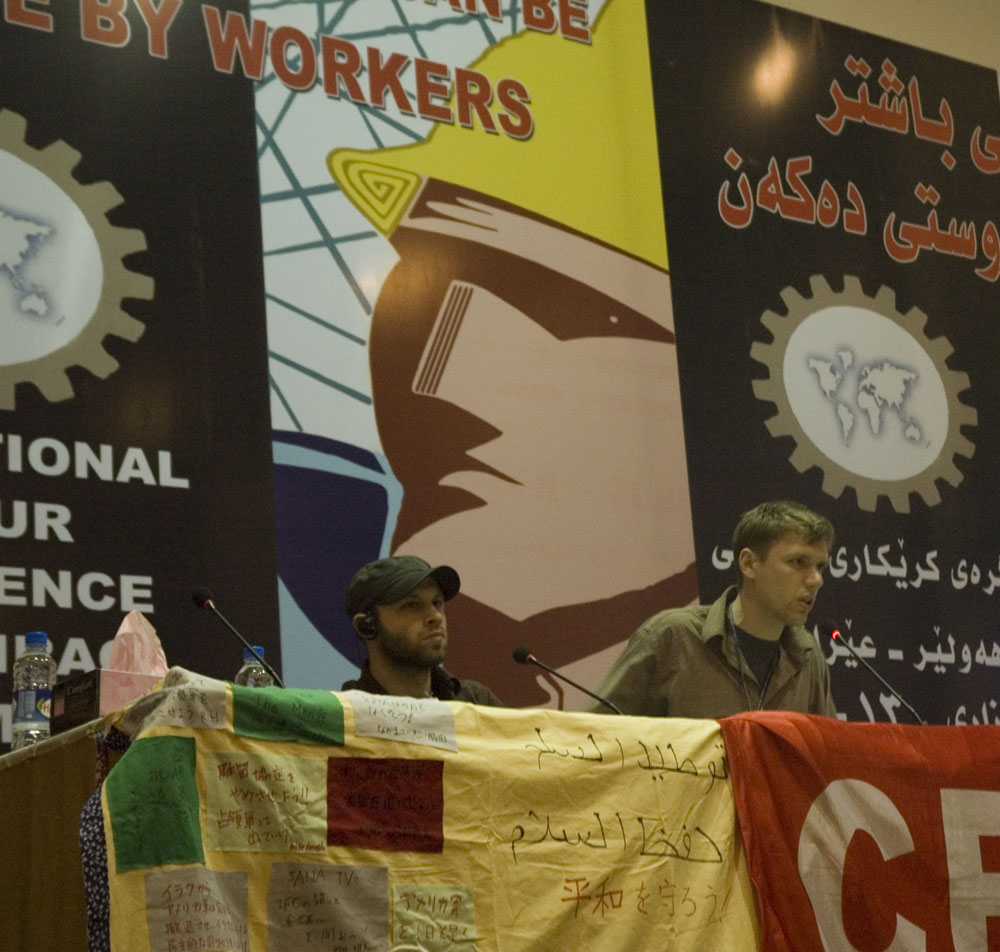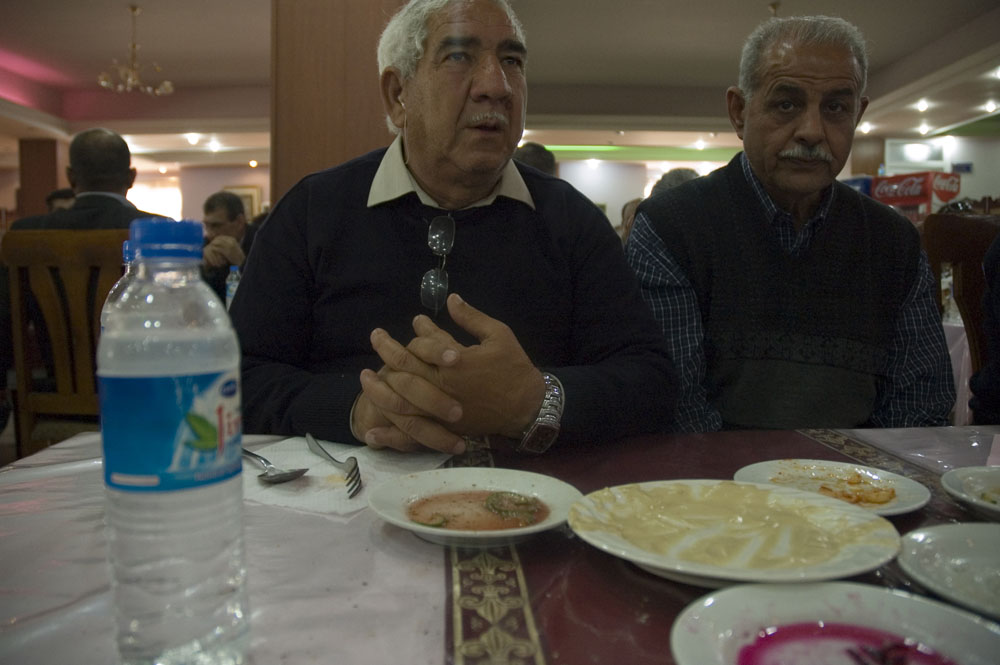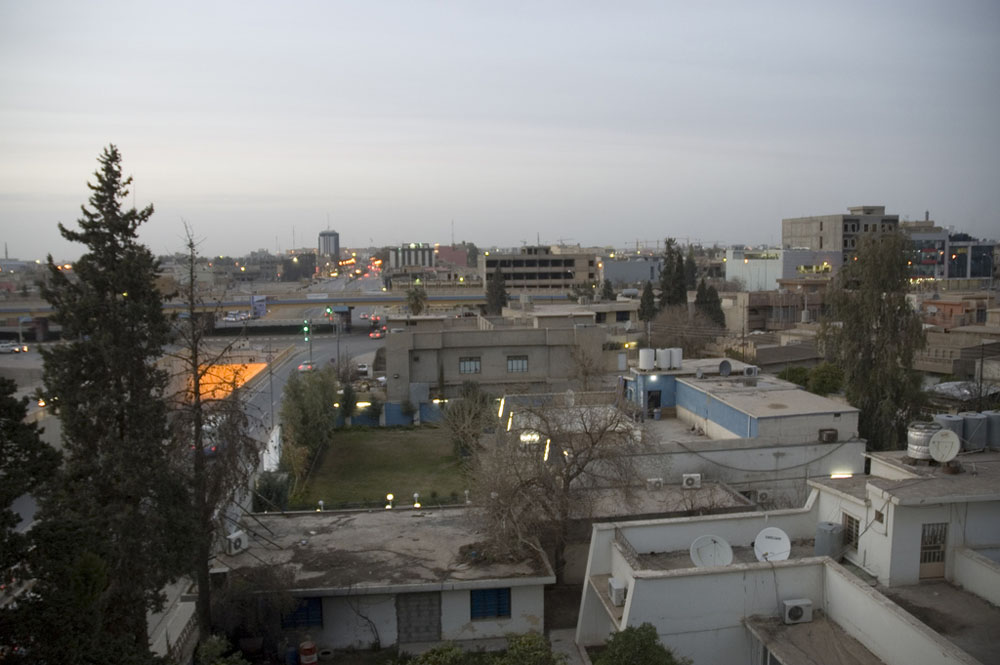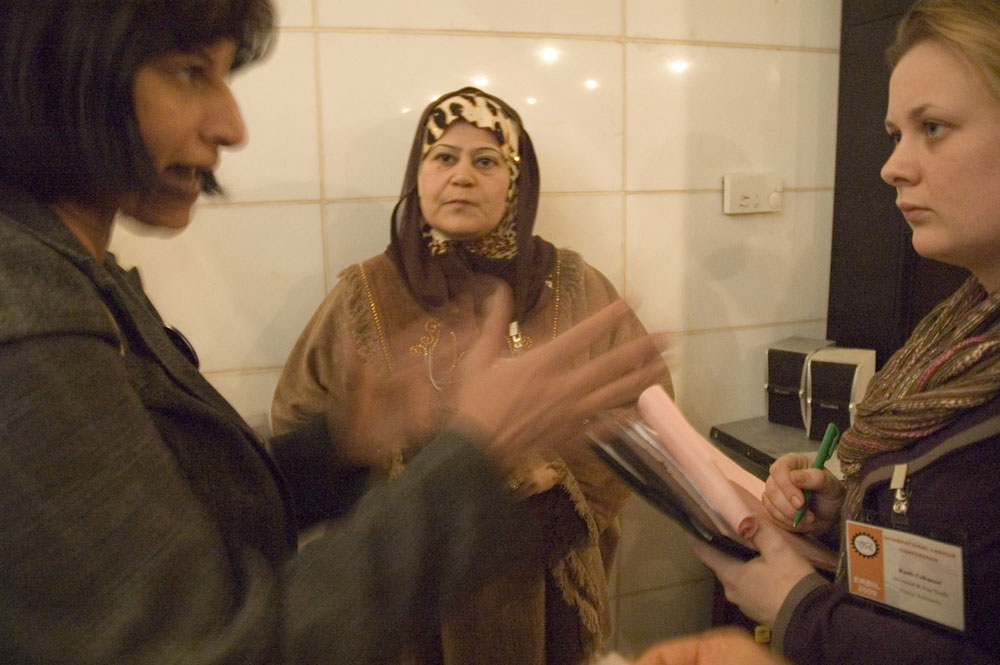 |
Iraq Trip Report Back: HumblingBy Aaron HughesThank you VVAW and US Labor Against the War for your generous contribution to help make IVAW's presence at the first International Labor Conference in Erbil, Iraq a reality.
Humbling is the most important word that I can use to describe my recent travels back to Iraq. As I think of how to share this experience with my fellow veterans this word comes to the front of my mind and silences my thoughts. Humbling. I start writing this report with caution and awareness that I can never fully understand or express the complexities, pains and hopes of the Iraqi people, but with confidence that I can share the compassion and love that was expressed by the Iraqis despite our contribution to their oppression. It had been well over four years since I last set foot in Iraq, a country that changed my life by awakening me to my own hypocrisies and ability to dehumanize "others." As the plane flew east into the night sky I wrote: On my way back to Iraq There was tightness in my shoulders when we landed. It was something in the familiarity of the landscape. The dust was the same gray white that I remembered. It washed away the bright colors. The cabs were the same, white with faded orange side panels, and they crowded the roads making the streets hum. The roadside stands were the same as the ones I had seen years earlier, but this time they lined the roads of the northern Iraq. In 2003 and 2004 I traveled throughout much of Iraq as an 88M truck driver, but never north of Kirkuk. Now, I was an hour north of Kirkuk in Erbil and despite its similar landscape to other parts of Iraq, it clearly felt different. It had a calm that did not carry the same uneasiness I had remembered. According to Samir Adil from the Iraq Freedom Congress and organizing committee of the First International Labor Conference this is why Erbil was chosen to host the conference. He said it was extremely important to have the conference in Erbil so workers from more volatile areas of Iraq could have a space to let down their guard and feel a sense of security. He continued the thought noting, there is so much fear and anxiety in most cities that the mental space to start thinking through the issues of workers rights is extremely difficult. As he was sharing this, I was thinking about the December bombing in Kirkuk that Samir had luckily survived. From the airport we were quickly driven through afternoon air past traffic circles and Kurdish Militiamen, stationed at every corner, to a western style hotel that was surrounded by concrete walls and had more Kurdish militiamen with AK-47s. After dropping our bags and taking a moment to freshen up we were taken out to a fast-food western-style restaurant where we were bestowed with Iraqi hospitality. We were spoiled with food and it became embarrassingly clear there was no way to refuse the generosity that was not deserved. At the dinner I met Harman, a college student in the local university. The night passed quickly and when I woke in the morning I wrote in my journal trying to wrap my head around the evening conversation: Harman at dinner last night. At a strange dinner for western fast food tastes I spoke with Harman, a student from the university here. The suffering he told me of... His eyes. They held tears but the tears never dropped. He told me of Saddam and the gas. And his love for Kurdistan.
And of the Americans...they do so many things wrong. Maybe even set bombs. His cousin recently died in an IED; but the Americans made it through with no scratches. Something in our conversation makes me want to cry. The guilt comes back and I have no right to say anything. I want to cry and say I am sorry but there is nothing for me to say. Kirkuk is a mess and the United States is not helping. It is the morning of day one. Birds hop and sing all over the pine trees outside my hotel patio door. The same dust smog sits over the city that I remember. The morning birds hide and coo in the trees and I think of my crazy dreams. Dreams of strange anxiousness were overwhelming. I woke many times tossing and turning; confused by the time change and no watch. The sun comes up at 6 AM and the air is gray and cool. Cool like a summer morning in the desert of the suburbs back home. I am in the desert again and gray brown white is omnipresent and I am stuck in western false luxury. The hotel is too much for me. I have taken so much from the Iraqis and yet I am taking more and they only share love and trust. Trust I do not deserve. I would love a sleeping bag and my truck hood. I would love to stay in a small house with kind hearts. Before I continue, I need to share a little about how this return journey came about. Over the past year IVAW Chicago has been working on building up relationships with labor, specifically US Labor Against the War (USLAW). This led Terry Davis from Chicago USLAW to invite me personally to speak at the December 2008 USLAW Steering Committee meeting. At this talk I heard a lot about the plans for an upcoming International Labor Conference in Iraq, which USLAW had already been working on for over a year. I was also afforded the opportunity to meet Amjad Ali from the Iraq Freedom Congress and a member of the planning committee of the conference. After hearing about the vision of the conference: to create a united front against the occupation and the prevention of trade union rights under the slogan of "a better world can be made by workers," I quickly started thinking about how valuable it would be for IVAW to attend the conference in order to take concrete steps towards our second point of unity: reparations for the human and structural damages Iraq has suffered and stopping the corporate pillaging of Iraq so that their people can control their own lives and future. I asked Michael Eisencher, the national coordinator for USLAW, if he thought it would be appropriate for IVAW to request an invitation to the conference. He responded very quickly by informing me he would ask the Iraqis and get back to me. Less then a week later I received an official invitation for IVAW to send one delegate to the conference and within just a few weeks of the original request, it was confirmed that IVAW would be able to send two members to attend the first ever International Labor Conference in Iraq. TJ Buonomo a former Army Intelligence Officer and myself were to join Mike Zweig of United University Professions and American Federation of Teachers (AFT) Local 2190, Bill Shortell President of the Central Connecticut Labor Council and International Association of Machinists (IAM), Jim Norris President of the United Steel Workers (USW) Local 675 and representative of the national USW's oil workers in the US, and Michael Eisencher. Humbling. The conference was set up to bring together the major labor constituencies from across Iraq to form a confederation based on worker rights. At the end of our second day, the eve of the conference, workers from fifteen of Iraq's eighteen provinces began to arrive. There were representatives from Iraq's oil and gas industry, its port union, the electrical generation and distribution industry, construction, public sector, transportation, communications, education, rail roads, service and health care industries, machinists and metal working sector, the petro-chemical industry, civil engineers, writers and journalists, food oil workers, tailors and students. The historical nature of the conference was clear. This opportunity for the international community and the workers across Iraq to show solidarity was long overdue. After the United States invaded Iraq and set up the provisional government, a new constitution was drafted that included worker rights. However, at the same time, Paul Bremer, head of the Coalition Provisional Authority, retained Saddam Hussein's labor laws.
In their 2008 Country Reports on Human Rights Practices (from February 25, 2009), the Bureau of Democracy, Human Rights, and Labor notes: "The constitution provides the right to form and join unions and professional associations, subject to regulating law. Labor Law 150 of 1987, enacted by the Saddam government, ...declared virtually all public sector workers to be government 'executives,' and therefore legally ineligible to form or to join unions, a move that, in effect, eliminated unions and the right of association from the public sector. In the private sector, the extant 1987 Trade Union Organization Law ...was also intended, in practice, to remove the right of association from a majority of private sector workers, because most private sector businesses employ fewer than 50 workers. Decree 8750 of 2005, which cancelled unions' leadership boards, froze their assets, and formed an inter-ministerial committee to administer unions' assets and assess their capacity to resume activity, also inhibited union activity. The laws and decree do not prohibit anti-union discrimination by employers or others. In addition to this oppressive legal and regulatory framework, violence and insecurity, high unemployment, and maladapted labor organizational structures inhibited the exercise of labor rights." Throughout the conference, in moments here and there, over sips of tea, in the hallway between talks, over a meal of lamb and rice, or in the marble floored lobby I had the opportunity to speak with the different labor leaders. Their stories were hopeful and humble. They were filled with courageous acts of resistance against the many odds stacked against them. Their government does not legally recognize unions and organizing in the public sector (seventy percent of the economy) is illegal. Union assets are frozen and confiscated. The US military has raided union leaders' homes and occupied factories and plants. The local militias target union leaders and female workers. Despite these odds, the unions are organizing, growing and winning. Leading by example is the Iraq Federation of Oil Unions (IFOU) lead by its president Hassan Juma'a Awad, which exploded in size over the past four years to over 25,000 members. It is the strongest and most powerful union in Iraq and is also extremely militant in regards to worker rights. For example, the union has protested, gone on strike, and used direct non-violent tactics to force the British occupation forces to stand down and furthermore drove the US contractor KBR from the oil fields near Basra. The National Electrical Association also has a history of great struggle. One representative from the Babel region shared a story that I still find hard to believe. In the most casual manner he said the US military had taken control of his power plant and was using it as part of a camp. The US military would no longer let the workers bring equipment into the now "secure area" to maintain the power plant. The tools and supplies were considered to be a security risk. The plant gave power to the surrounding area and the workers did not want their plant to fall into disarray like so many others. So they started a demonstration and a strike. The national government called the union leaders and told them to stop and said they were making it worse on themselves and aggravating the US military. Despite this, the workers continued to strike and forced the US military to back down and leave the power plant alltogether. These are the stories from Iraq that need to be heard. One of the women from the Women's Union and the Oil Federation shared a story about national women's day. She said even though women are targeted, her women's group stood in public on International Women's Day in Basra, one of the most dangerous cities for women. It was a small demonstration of only about twenty women but they stood strong despite the repercussions that they were all too familiar with. Another woman had traveled up from Samara, a city that was ravaged by the US forces. She spoke of the ongoing work with widowed women. She was trying to get a can factory built in the city so the women who now had no form of income could have work and feed their children. She also told me about the overwhelming number of orphans and the need to build orphanages. Humbling. The conference was a major success. Delegations came not only from across Iraq and the United States but also from the United Kingdom, Japan, South Africa, Australia, and Iran. At the closing of the two day conference, three of Iraq's major labor organizations, the Iraq Federation of Oil Unions, the Nationwide Electricity Association, and the General Federation of Workers Councils and Unions, came together with their international allies and signed an agreement to create a new labor confederation. In addition to the formation of a new confederation dedicated to struggling for the Iraqi workers there were also eight resolutions passed. They are: 1. Resolution to form an international front against wars, economic blockade and the prevention of union rights; During the second day of the conference there were workshops conducted on the risks of privatization, the draft oil and gas law, labor laws and trade union freedoms, women's and trade union action, global labor solidarity, war and its psychological repercussions, and labor media. The most impressive panel was the one on women's rights lead by Hirman Kazim. She spoke of the targeting of women and the abuses they face at home and at the work place. There was hope that at the next meeting of the confederation there could be a resolution passed in favor of women's rights. TJ and myself were asked to present during the workshop titled "War and Its Psychological Repercussions." I still get anxious thinking about going up onto the stage in front of so many individuals that I had either directly or indirectly oppressed and violated. I vividly remember walking up on stage. My heart was racing; I could feel the clamminess of my skin and the sweat on my forehead. I started slowly for the translator: "I was here in your country pointing my weapon at your children, at your communities and for that I am sorry. But forgiveness is something I cannot ask for and responsibility is something I have to take. This is why I am here today representing Iraq Veterans Against the War to take responsibility for what has been done to your country and stand in solidarity with the people of Iraq." I continued by sharing the history of IVAW, the story of GI resistance, and how I got involved with the movement. I concluded my talk by reading a poem about the little Iraqi boy who had moved me from speaking out against the war to taking action. He was a little boy who was receiving help to get a prosthetic arm and eyes in the states from an organization called Global Medical Relief Fund. I had the opportunity to befriend the young boy. When he returned in 2007 to the volatile Baghdad, I took to the streets. I read: "Ahmed Jabar Shareef is my friend and my guardian angel. TJ spoke directly after me and denounced the manipulation of intelligence, bribing of Iraqi journalists, the torture of Iraqi prisoners, the suppression of worker rights, and attempts by the US government and multinational corporations to control Iraqi oil. After TJ finished speaking an Iraqi man stood up and took the microphone and began speaking eagerly. He then began walking up toward the stage and I thought to myself that whatever this was I deserved it. As the translation came through I heard, "I just want to come on stage and give these men a... hug."
I began to cry as I was embraced. As the audience stood and celebrated, once again I was reminded life is for love and trust not cynicism and anger. I was later told the man was known to be a staunch nationalist. Humbling On the final day, the Iraqi representatives headed back to their respective provinces and the international delegations prepared to leave. Nadia, one of the leaders of the Women's Union, shared this response to our talks with me before we parted ways: "Thanks for being here Please consider making a generous donation to the conference through USLAW. The Conference gave the Iraqi Unions 60,000 dollars in loans. Visit: uslaboragainstwar.org Aaron Hughes joined Iraq Veterans Against the War in 2006 and has served as Member, a Chapter President, a Regional Coordinator, Board Member, and Organizer. He helped found the Winter Soldier Project, the Warrior Writers Project, and the Chicago Chapter.
|





